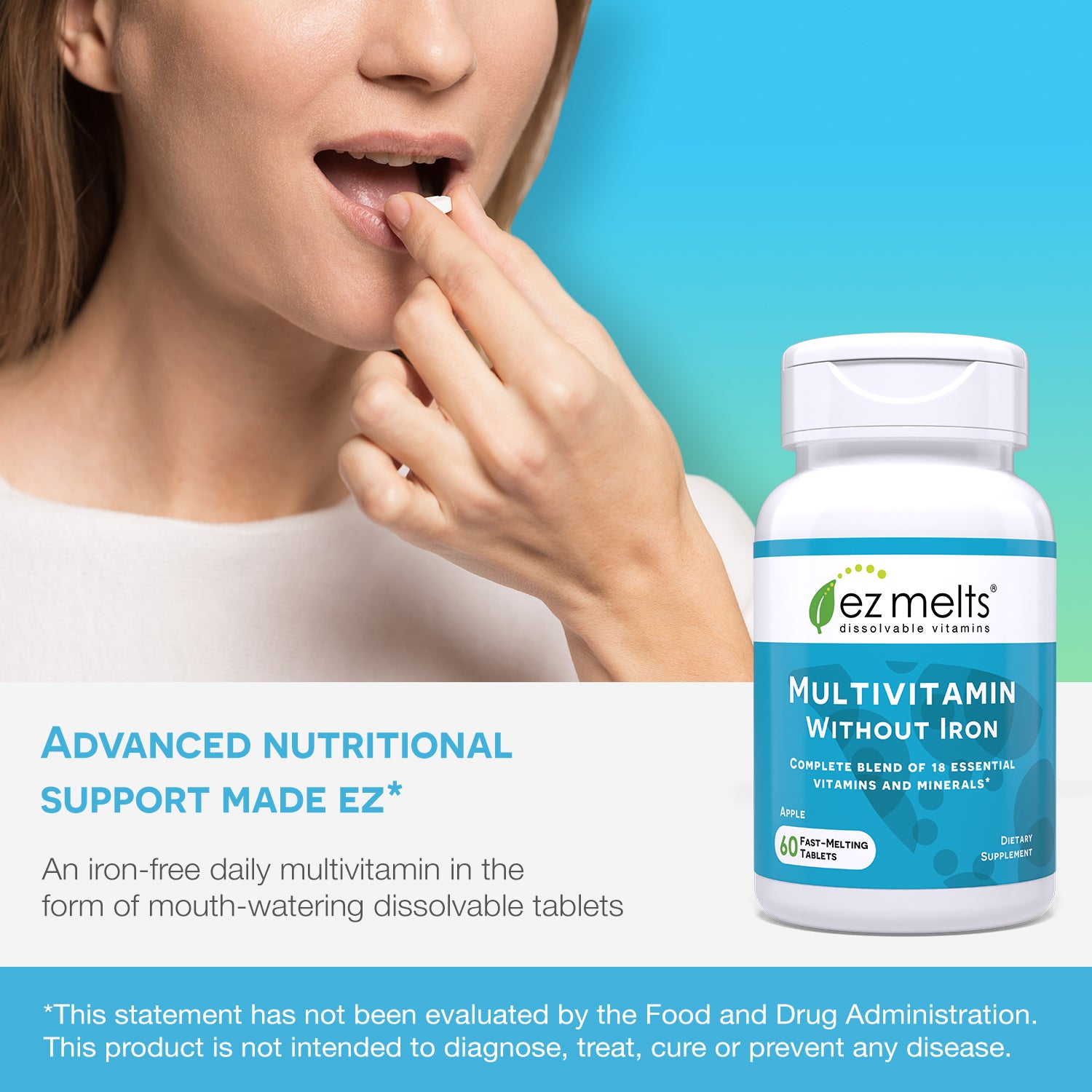Vitamins for Men
Sort by:
7 products
7 products
- Our Zinc supplement supports healthy digestive and immune system function
- Promotes protein synthesis and healthy hormone levels
- Supports skin health and cellular renewal
- 60 fast melting tablets with "Blueberry Blast" flavor
- MADE IN THE USA: Zero Sugar, Vegan, Gluten-Free, Non-GMO, Natural Flavors, Natural Sweeteners, Natural Colors
- Fast Dissolving 100% Vegan Multivitamin with Iron!
- Daily, advanced nutritional support multivitamin for men and women
- Supports increased energy and antioxidant protection
- Provides the essential vitamins, minerals and nutrients necessary for a balanced diet
- 60 fast melting tablets with "Tropical Cherry" flavor
- MADE IN THE USA: Zero Sugar, Vegan, Gluten-Free, Non-GMO, Natural Flavors, Natural Sweeteners, Natural Colors
- Vitamin D3 increases calcium absorption for strong bones and teeth
- Promotes healthy cell growth and proper immune function
- Helps improve bone health and the musculoskeletal system
- 90 fast melting tablets with "Green Apple" flavor
- MADE IN THE USA: Zero Sugar, Vegan, Gluten-Free, Non-GMO, Natural Flavors, Natural Sweeteners, Natural Colors
- Our Calcium and magnesium supplement support healthy bones and teeth
- Promotes normal heart rhythm and cardiovascular health
- Vegan Vitamin D3 enhances calcium absorption
- 60 fast melting tablets with "Strawberry Smoothie" flavor
- MADE IN THE USA: Zero Sugar, Vegan, Gluten-Free, Non-GMO, Natural Flavors, Natural Sweeteners, Natural Colors
- Vitamin D3 increases calcium absorption for strong bones and teeth
- Vitamin K2 as MK-7 promotes arterial and skeletal system health
- Promotes healthy cell growth and proper immune function
- Helps optimum transfer of calcium from the arteries into the bones
- Helps improve bone health and the musculoskeletal system
- Supports overall cardiovascular system health
- 90 fast melting tablets with "Green Apple" flavor
- MADE IN THE USA: Zero Sugar, Vegan, Gluten-Free, Non-GMO, Natural Flavors, Natural Sweeteners, Natural Colors
-
multivitamin without iron that delivers 100% daily value of 18 key nutrients to support overall health
-
Formulated with methylated vitamins: includes methylated folate and methylated B12, the bioactive forms of these B vitamins
-
Provides 18 essential vitamins, minerals, and nutrients necessary for a balanced diet
-
For daily, advanced nutritional support
-
Formulated to quickly dissolve in mouth – no need to chew or add water
-
Contains ZERO sugar
-
Great-tasting all-natural apple flavor
Our Essential Men's Health Bundle makes it easy to create an optimal vitamin regimen without having to think about each one individually. All our quick melting tablets come in customer-approved, delicious flavors.
This bundle includes:
1 bottle of Calcium & Magnesium
1 bottle of Multivitamin
1 bottle of Vitamin D3
1 bottle of Zinc
MADE IN THE USA: Zero Sugar, Vegan, Gluten-Free, Non-GMO, Natural Flavors, Natural Sweeteners, Natural Colors
Calcium & Magnesium
- Calcium mineral supplement supports healthy bones and teeth
- Promotes normal heart rhythm and cardiovascular health
- Vegan Vitamin D3 enhances calcium absorption
- 60 fast melting tablets with "Strawberry Smoothie" flavor
Multivitamin
- Fast Dissolving 100% Vegan Multivitamin, now with Iron!
- Daily, advanced nutritional support
- Supports increased energy and antioxidant protection
- Provides the essential vitamins, minerals and nutrients necessary for a balanced diet
- 60 fast melting tablets with "Tropical Cherry" flavor
Vitamin D3
- Vitamin D3 increases calcium absorption for strong bones and teeth
- Promotes healthy cell growth and proper immune function
- Helps improve bone health and the musculoskeletal system
- 90 fast melting tablets with "Green Apple" flavor
Zinc
- Zinc supports healthy digestive and immune system function
- Promotes protein synthesis and healthy hormone levels
- Supports skin health and cellular renewal
- 60 fast melting tablets with "Blueberry Blast" flavor
Vitamins for Men: Supporting Strength, Energy, and Daily Wellness
Men’s health depends on a balance of nutrition, physical activity, sleep, and stress management. While the foundations of good nutrition apply to everyone, men have certain nutrient needs that differ slightly from women — particularly when it comes to iron, vitamin D, calcium, and zinc.
From maintaining normal energy metabolism to supporting bone and muscle function, vitamins and minerals provide the raw materials for the body’s everyday performance. Vitamins for men can be a practical way to fill in gaps, especially for men with busy schedules or dietary restrictions.
This article explores the key vitamins most often associated with men’s health, how they work in the body, and why they are especially relevant across different stages of life.
Why Men’s Nutritional Needs Are Unique
While men and women share most nutrient requirements, there are a few differences that stand out:
- Iron: Men usually require less than women. Excess iron can build up if unnecessary, so some men benefit from multivitamins without iron.
- Zinc: Supports immune system function, protein metabolism, and tissue repair.
- Vitamin D and Calcium: Both nutrients support bone and muscle health, which are important throughout life.
- Magnesium: Plays a role in hundreds of biochemical processes, including energy metabolism and muscle function.
Key Vitamins and Minerals for Men
1. Multivitamins for Men
Multivitamins are designed to provide broad nutritional coverage. For men, multivitamins typically focus on vitamins like D, B-complex, C, and minerals such as zinc and magnesium.
- With iron: Suited for men who may need additional iron based on diet or health circumstances.
- Without iron: Often recommended for men who already meet their iron needs through food, especially since men are not at the same risk of iron deficiency as women of childbearing age.
2. Vitamin D3
Vitamin D supports calcium absorption, muscle function, and immune regulation. Many adults do not get enough vitamin D through sunlight or food, making supplementation common.
Food sources: Fatty fish, fortified milk, and egg yolks.
3. Vitamin D3 + K2
When paired together, vitamin D3 and vitamin K2 help the body regulate calcium. Vitamin D helps absorb calcium, while K2 helps direct calcium to the right places in the body, such as bones.
Food sources: Fatty fish, eggs, and fermented foods (for K2).
4. Zinc
Zinc is vital for immune system function, wound healing, protein synthesis, and normal cell division. It also contributes to overall metabolic health and is a common nutrient in vitamins for men.
Food sources: Oysters, beef, pumpkin seeds, and legumes.
5. Calcium & Magnesium
-
Calcium: Essential for bone and teeth strength, as well as muscle contraction and nerve function.
-
Magnesium: Involved in over 300 enzymatic reactions, including energy production, muscle relaxation, and cardiovascular balance.
Food sources: Dairy products, leafy greens, almonds, beans, and seeds.
Men’s Nutritional Needs Across Life Stages
Young Adults (20s–30s)
- Focus on B-complex vitamins for energy metabolism.
- Vitamin D and calcium help build bone mass that lasts into later years.
Midlife (40s–50s)
- Prioritize antioxidants such as vitamin C and E to help protect against oxidative stress.
- Magnesium and zinc support metabolic function and tissue repair.
Later Years (60s and beyond)
- Vitamin D3 and calcium become especially important to help maintain bone and muscle strength.
- Multivitamins without iron are often better suited unless otherwise recommended.
- B12 supplementation may be needed since absorption decreases with age.
Lifestyle Habits That Complement Vitamin Intake
While supplements are valuable, lifestyle choices have an equally important effect on men’s health.
- Balanced nutrition: Whole foods provide vitamins, minerals, and phytonutrients.
- Physical activity: Weight-bearing exercise supports bone health, while strength training helps preserve muscle.
- Adequate sleep: Rest helps regulate hormones and allows the body to recover.
- Stress management: Chronic stress can tax the body and deplete certain nutrients.
- Hydration: Water is essential for nutrient transport, energy, and metabolism.
Supplements vs. Diet
The ideal way to get vitamins is through a varied diet. However, many men fall short due to busy routines, food preferences, or dietary restrictions.
Supplements can help:
- Multivitamins: Cover general gaps.
- Vitamin D: Especially useful for those with limited sunlight exposure.
- Calcium & Magnesium: Support bone and muscle strength if dietary intake is low.
- Zinc: May help when dietary sources are insufficient.
Safety Considerations
- Iron: Men should be cautious with iron supplements unless prescribed, as excessive intake can be harmful.
- Vitamin D: Too much can lead to imbalances, so monitoring levels is important.
- Balance: More is not always better. Over-supplementing can cause side effects.
Always check with a healthcare professional before beginning a new supplement routine.
Final Thoughts
Vitamins are not quick fixes — they are part of a long-term commitment to wellness. For men, nutrients like vitamin D3, calcium, magnesium, zinc, and B-complex vitamins provide the foundation for energy, bone strength, and overall resilience.
Supplements can help bridge gaps in diet, but they work best when combined with healthy lifestyle choices such as balanced nutrition, exercise, stress management, and quality sleep.
FAQs About:
Vitamins for Men
Some of the key vitamins and minerals for men include vitamin D, vitamin B12, zinc, magnesium, calcium, and a broad-spectrum multivitamin. These nutrients help support energy metabolism, muscle and bone health, and overall wellness.
Yes. Men generally require less iron than women because they do not experience monthly blood loss. Many men choose multivitamins without iron unless a healthcare professional recommends otherwise.
Vitamin D supports calcium absorption, which is important for maintaining bone and muscle health. Since many adults don’t get enough sunlight exposure, vitamin D is a common nutrient of focus for men.
Zinc is involved in enzyme activity, immune system function, protein metabolism, and tissue repair. It plays a role in daily vitality and is often emphasized in men’s nutrition.
A daily multivitamin can help fill nutritional gaps from diet, especially for men with busy lifestyles or dietary restrictions. Whether with or without iron, the right multivitamin should complement — not replace — a balanced diet.
































